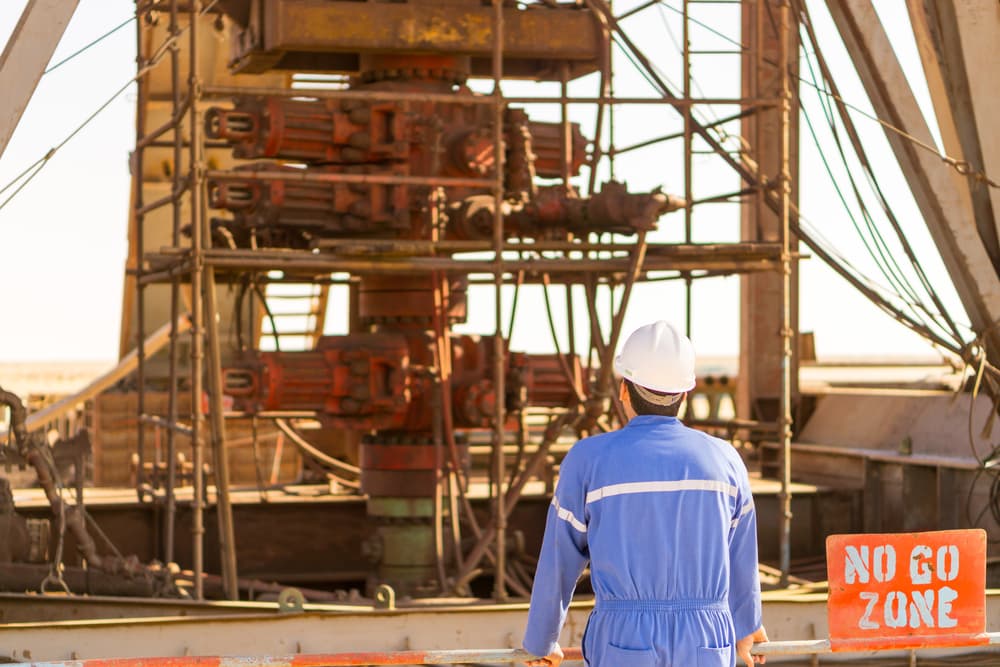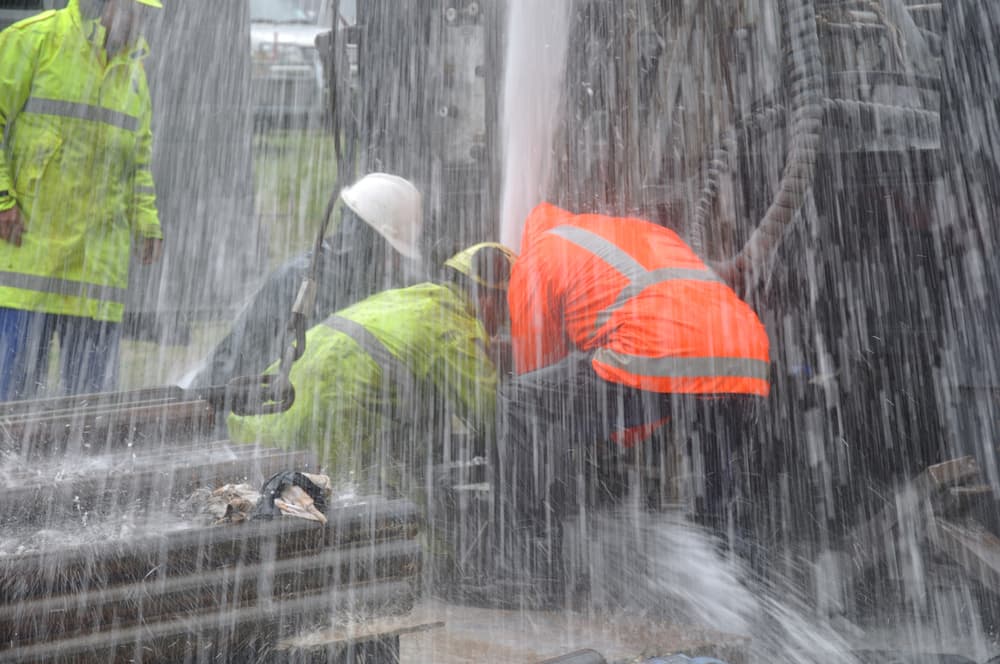Oil well blowouts can result from several different types of negligence, including improper maintenance, lack of training on job sites, and inadequate supervision.
If you suffered injuries in an oil field accident, speak with experienced legal counsel immediately. A knowledgeable oil field accident attorney can determine your eligibility for filing a workers’ compensation claim and/or a third-party claim for monetary damages. Your lawyer can then handle every step of the process for you and work to maximize your final compensation award.
How do Well Blowouts Occur in Oil Field Accidents?
In the oil industry, well blowouts can have devastating consequences for workers.
These incidents often occur due to negligence, which can take various forms in the complex oil drilling operations.
- One common cause of well blowouts is the failure to properly maintain and inspect equipment. Oil drilling rigs rely on many mechanical components, such as blowout preventers and casing, to control the flow of oil and gas. Neglecting routine maintenance and inspections can damage these critical parts, increasing the risk of malfunction during drilling operations.
- Moreover, inadequate training and personnel supervision can contribute to oil field negligence. Operating a drilling rig requires a high level of skill and knowledge, and any lapse in judgment or procedure can have dire consequences. Without proper training, workers may make mistakes that result in a blowout, such as incorrectly shutting off valves or misinterpreting pressure readings.
- A lack of adherence to safety regulations and protocols can lead to well blowouts. Oil drilling is a highly regulated industry, with strict guidelines in place to prevent accidents and protect workers and the environment. However, companies may cut corners or prioritize profits over safety, leading to shortcuts in procedures or the use of substandard equipment.
- In some cases, well blowouts occur due to a combination of these factors. For example, a company may fail to properly inspect equipment while also pressuring workers to meet tight deadlines, leading to rushed procedures and increased risk of error. Additionally, a culture of complacency within an organization can increase negligence, as workers may become desensitized to safety concerns over time.
The consequences of well blowouts can be severe and long-lasting. In addition to the immediate risks of fire, explosions, and toxic gas releases, blowouts can result in extensive environmental damage, including oil spills, contamination of water sources, and severe injuries for oil field workers.
If you suffered injuries in a well blowout that took place on an oil field, an experienced oil field accident lawyer in your area can protect your legal rights and present your options.
First, you may pursue a workers’ compensation claim for various benefits. Moreover, if a negligent third party caused the well blowout to occur, you may also file a third-party claim or lawsuit for additional compensation.
Common Injuries in a Well Blowout Accident
During a well blowout accident in an oil field, workers are exposed to numerous hazards that can result in injuries, ranging from minor to severe – and sometimes even fatal.
One of the most immediate and serious risks during a blowout is being struck by flying debris. As pressure builds up and equipment fails, fragments of metal, rocks, and other materials can be propelled with significant force, causing blunt force trauma, lacerations, and penetrating injuries.

Workers who are caught in the path of these projectiles can suffer severe wounds, including fractures, concussions, and deep cuts.
Oil and gas can ignite, leading to explosions and fires, engulfing nearby workers in flames, resulting in thermal burns to their skin and respiratory burns if they inhale hot gasses or smoke. Burns can cause extensive tissue damage and require immediate medical attention.
Additionally, workers involved in well blowout accidents may suffer from respiratory injuries due to exposure to toxic gasses and chemicals. Hydrogen sulfide, methane, and other volatile compounds released during a blowout can irritate the worker’s lungs and airways, leading to symptoms such as coughing, difficulty breathing, and chemical pneumonitis. Prolonged exposure to these hazardous substances can also result in long-term respiratory problems and chronic illnesses.
Furthermore, falls and crush injuries are common in well blowout accidents – particularly if workers are caught off guard or lose their footing during the chaotic aftermath of a blowout.
Slippery surfaces, uneven terrain, and damaged equipment can increase the risk of falls while collapsing structures and equipment malfunctions can lead to crush injuries if workers are pinned or trapped beneath heavy objects.
Filing a Workers’ Compensation Claim Following a Well Blowout in an Oil Field
Following a well blowout in an oil field, injured workers may receive workers’ compensation benefits to cover the costs associated with their injuries.
These benefits are crucial for providing financial support during recovery and ensuring workers can access necessary medical treatments.

- One of the primary types of workers’ compensation benefits is medical coverage. This includes the cost of hospital stays, doctor visits, prescription medications, surgeries, and rehabilitation (including physical or occupational therapy). Given the severity of injuries that can result from a well blowout, such as burns, fractures, and respiratory issues, comprehensive medical care is essential for an injured worker’s recovery.
- In addition to medical benefits, injured workers can receive temporary disability benefits if they cannot work due to their injuries. These benefits provide a portion of the worker’s regular wages while they are recovering and unable to perform their job duties. The amount typically depends upon the severity of the injury and the worker’s average earnings before the accident.
- If a worker suffers a permanent injury or disability from a well blowout, they may be eligible for permanent disability benefits. These benefits are designed to compensate for the long-term effects of the injury on the worker’s ability to earn an income. The amount and duration of permanent disability benefits depend on the nature and extent of the injury and how it affects the worker’s future employment prospects.
- Workers’ compensation also includes vocational rehabilitation benefits. If an injured worker cannot return to their previous job due to their injuries, they may receive assistance with retraining and finding new employment. This can include job placement services, educational programs, and other support to help the worker transition to a new career.
- In the unfortunate event that a well blowout results in a worker’s death, workers’ compensation provides death benefits to the surviving dependents, such as a spouse or children. These benefits typically include a portion of the deceased worker’s wages and coverage for funeral and burial expenses. Death benefits are vital for helping the family cope financially during such a difficult time.
All of these benefits are essential for supporting injured workers and their families, helping to ensure that they receive the care and financial assistance necessary to recover and move forward with their lives.
Proving Third-party Negligence in an Oil Field Accident Case Involving a Well Blowout
Proving third-party negligence in an oil field accident case involving a well blowout can be complicated, but it’s essential for injured workers seeking compensation beyond workers’ compensation benefits.
Third-party negligence refers to the responsibility of entities other than the employer, such as equipment manufacturers, subcontractors, or service providers, who may have contributed to the accident.
To establish third-party negligence, you must demonstrate that the third party had a duty of care. This means showing that the third party failed to ensure the safety of the equipment or services they provided.
For instance, an equipment manufacturer has a duty to design and produce safe, reliable machinery. Similarly, a subcontractor hired to perform specific tasks must do so in a safe and competent manner.

The next step is to prove that the third party breached their legal duty of care. This shows that the third party failed to uphold safety standards or provided faulty equipment.
For example, if an equipment manufacturer supplied defective blowout preventers or if a subcontractor did not follow proper safety protocols, this may constitute a breach of duty.
Once you establish a breach of duty, you must demonstrate causation, meaning that the third party’s negligence directly led to the well blowout and subsequent injuries. Maintenance records, inspection reports, and eyewitness testimonies can prove this.
For instance, if an investigation reveals that the blowout preventer failed due to a known defect that the manufacturer did not address, this may establish a clear link between the third party’s negligence and the accident.
Finally, you must show you suffered actual damages due to the well blowout. Damages can include medical expenses, lost wages, pain and suffering, and other costs associated with the injury. Medical records, financial statements, and expert testimonies can substantiate these claims.
An experienced oil field accident lawyer in your area can determine your eligibility for filing a third-party claim or lawsuit. If you can move forward, your attorney can gather the appropriate evidence and pursue the full compensation you deserve.
Recovering Third-party Damages in an Oil Field Accident Case that Involves a Well Blowout
In an oil field accident involving a well blowout, injured workers can recover damages from third parties whose negligence contributed to their accident.
These damages compensate injured workers for their losses and hold responsible parties accountable for their actions.
- One type of recoverable third-party damage is medical expenses. Injured workers can seek compensation for the cost of medical treatment related to their injuries beyond what workers’ compensation benefits provide. Expenses can quickly add up, especially for severe injuries resulting from a well blowout, and recovering these costs can help to alleviate the financial burden on the injured worker and their family.
- Another category of recoverable damages is lost wages and loss of earning capacity. If an injured worker cannot work due to their injuries, they may be entitled to compensation for the wages they would have earned during their recovery period. Additionally, if the injuries result in a long-term or permanent disability that affects the worker’s ability to earn an income in the future, they can seek damages for their loss of earning capacity.
- Pain and suffering includes physical pain, emotional distress, and mental anguish resulting from the injuries and their effect on the injured worker’s life. While it can be challenging to quantify these damages, courts may consider factors such as the severity of the worker’s injuries, the duration of their pain and suffering, and the effects on the injured worker’s overall quality of life when determining compensation.
- In addition to compensatory damages, injured workers may recover punitive damages in cases involving egregious negligence or intentional misconduct by third parties. Punitive damages punish the responsible party and deter similar wrongful behavior. However, they are less common and typically require evidence of willful or reckless disregard for worker safety on a job site.
Compensation for these damages ensures that injured workers receive the support they need to recover from their injuries and move forward with their lives.
Speak With a Knowledgeable Oil Field Accident Attorney Today
If you recently suffered injuries in a well blowout that took place on an oil field, you have legal options available.
An experienced personal injury lawyer can determine your options, file the appropriate claim(s) on your behalf, represent you during all legal proceedings, and aggressively fight for the compensation you deserve.
